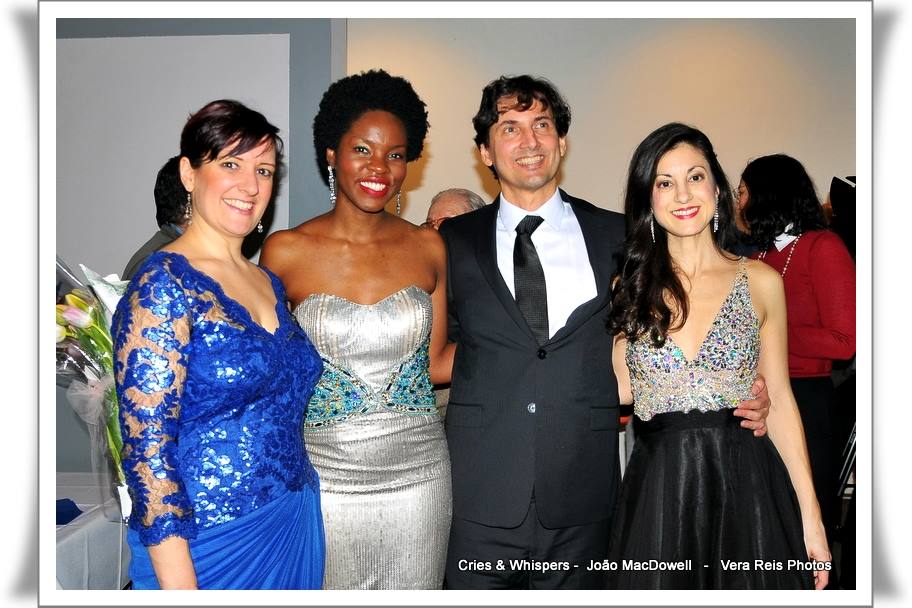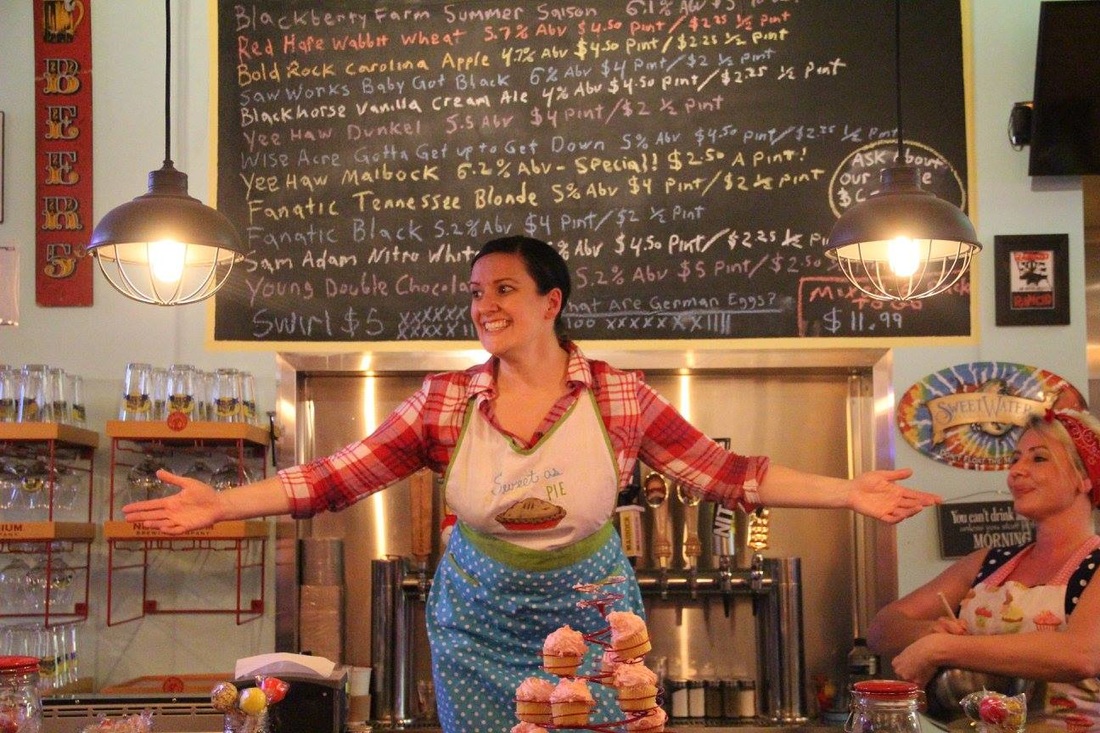| Apologies for not writing for a few days. I offer up a #ThrowbackThursday to make amends. This photo was taken at the world premiere of João MacDowell's opera Cries and Whispers. To my (stage) left is soprano Kristin Young, the composer, and soprano Alexandra Filipe. |
|
0 Comments
Today I sang Christmas carols with a group of lovely ladies at a beautiful brownstone in Brooklyn. Sometimes being a singer opens unexpected doors.
I just read a review in a publication that I will not name to protect the innocent. I will say that it is, theoretically, a publication that has multiple editors. It is not a blog. In it, the reviewer called the orchestra a "band," timpani "kettledrums," and stated that a "viola player" led the tuning. All in the opening paragraph.
Let's ignore the fact that an orchestra's tuning does not require mention in a review. Nor does the number of bouquets the soloist gets. Let's also ignore that the "reviewer" described what the stage looked like before the orchestra entered. And further, let's ignore that there were multiple misspellings, errors in punctuation, and terrible grammar throughout. Why do people who know literally nothing about classical music (or, in this case, music) offer up their opinions and critique as if they are experts? And why would a publication of any kind ask someone who knows nothing about music to be their music critic? This is hardly limited to music. Climatologists regularly have to share the stage with know-nothings who offer up an "opposing-view" on climate change as if the opinion of a non-scientist has any value in this context. And yet we are all forced to endure this nonsense over and over again. We watch Neil deGrasse Tyson get in a twitter war with a flat-earther. It's embarrassing and maddening, and insulting to people who have devoted their lives to excellence and mastery. WHY ARE WE AFRAID OF EXPERTS? WHY DON'T WE RESPECT KNOWLEDGE? To quote Barack Obama "Ignorance is not a virtue." If you are giving ignoramuses a podium at which they trumpet their ignorance, you are thumbing your nose at every person in the world who bothers to try to be good at and knowledgeable about something. You are telling experts that you do not value their expertise. For the record, I wrote a mean comment on this article. I couldn't not. That's not normally my way, but it's so incredibly insulting to the HUNDREDS OF THOUSANDS of people currently alive in the United States who have studied enough music to have a basic knowledge of and appreciation for what this particular orchestra was offering on this particular evening. Shame on you, unnamed-publication-which-has-access-to-many-people-who-could-write-an-accurate-and-useful-review. Shame on you for perpetrating ignorance. Virgil Thomson is doing summersaults in his grave.
This morning on NPR, I heard a report about the gender wage gap that exists in the arts. The reporters sounded surprised by this because the arts are "so progressive." I was not. And while a wage gap is troubling, what I find even more troubling is how much harder it is for women to get hired to work in the arts. I can't speak to other art forms, but the bias against women in opera is staggering.
Case in point: The Metropolitan Opera is currently running a production Kaija Saariaho's opera L'Amour de Loin, which is the SECOND opera composed by a woman that the company has produced in its entire history, the first being Ethel Smyth's Der Wald in 1903...113 years ago. It is being conducted by Susanna Mälkki, who is only the FOURTH woman to grace the podium in the illustrious company's 133-year history. N.B. I saw this production last night. I loved it. The piece is more atmospheric than dramatic, which is, perhaps, not to everyone's taste (the nice lady sitting next to us in the Family Circle left at intermission), but the singing is very good, the production is mesmerizing, and the score is transcendant. You should go see it. It's playing through December 29th. While female composers and conductors, I think, have the hardest time of it, female orchestral musicians have fought terrible biases - that is until orchestras implemented blind auditions, where auditioners play from behind a screen, which has, thankfully, increased the number of female and minority hires since the practice began. We singers most notably suffer from gender bias when it comes to the stories we tell and who we use to tell them. If we look at Opera America's ten most performed operas in North America, and break down all of the roles by gender, you'll note that there are approximately 40% more roles for men than for women.* Plus, two of the operas on the list, both by Rossini, use only male chorus. I would like to say that composers writing operas today are doing a better job of using female characters to tell their stories, but I wasn't able to find a pithy list of most-performed operas composed since 1985 to actually do that kind of analysis. If you find one and send it to me, I'll happily do the breakdown on the roles in those operas as well. I am not even addressing administrative and artistic leadership, stage directors, stage crew, designers of all stripes, or any of the many other folks who work together to put on an opera. If you do a little reading, you'll see the same story played out for all of these folks, too, save the traditonally "girly" jobs of costume and make-up design, where it's more equitable. Why, pray tell, would this be? As Ms. Saariaho said in her recent interview with NPR "half of humanity has something to say." Do we honestly not care about hearing women's voices? About telling women's stories? If you are an opera producer, as I am in a loose sense, are you prioritizing gender parity when you pick your seasons? If you're a commissioning organization, are you looking at female composers? Are you looking at stories about women as told by women? Women make up more than half of the population of the world. And I would argue that women make up the majority of professionally trained operatic singers. Anyone who holds auditions can tell you that for every 10 men requesting an audition, there are between 50 and 90 women. (If you are one of those people who holds auditions, please report your numbers in the comments field.) Can we do better, please? This is just embarrassing. *I used AGMA's Schedule C Classification of Roles to create this spreadsheet. ...is to listen to Bach cello suites on Spotify.
Today I'm listening to the Indie Opera Podcast episode that was re-released today and arrived in my inbox. (You, too, can have an episode delivered to your inbox every day, by clicking here). In this particular episode (#6) Peter and Noah wrestle with the difference between opera and musical theatre, and reflect on what makes for a good libretto. It's super interesting - really.
I confess that I watch more TV than I think I should. Mostly I watch crime dramas (Law and Order SVU has gotten me through more than a few bouts of ennui).
I also confess that I eat too much bread and not enough vegetables. This time of year - the most stressful time of year - when all things converge and my anxiety levels are higher than normal - I eat a lot of bread and I watch a lot of crime dramas (although, I just started watching Homeland, which is, I guess, a variation on that theme.) Somehow I've never performed any of the songs of Hugo Wolf. I'm not sure how that happened, but I will be making my Wolf debut tomorrow in a small concert produced by the Schubert Club of Fairfield County (Connecticut).
If, by some tiny chance, you're near New Canaan, feel free to check out this very informal event. I'll be singing two Wolf songs and a song by Mahler with a wonderful pianist, Stephen Sharp. I think there might also be food. 3:00 p.m. New Canaan Inn Schubert Club Performers Workshop |
AuthorOpera singer, opera producer, podcast co-host, lover of music, travel, food, and all things mind-bending. Archives
December 2018
Favorite PostsCategories
All
|


 RSS Feed
RSS Feed